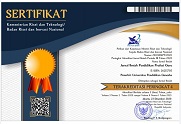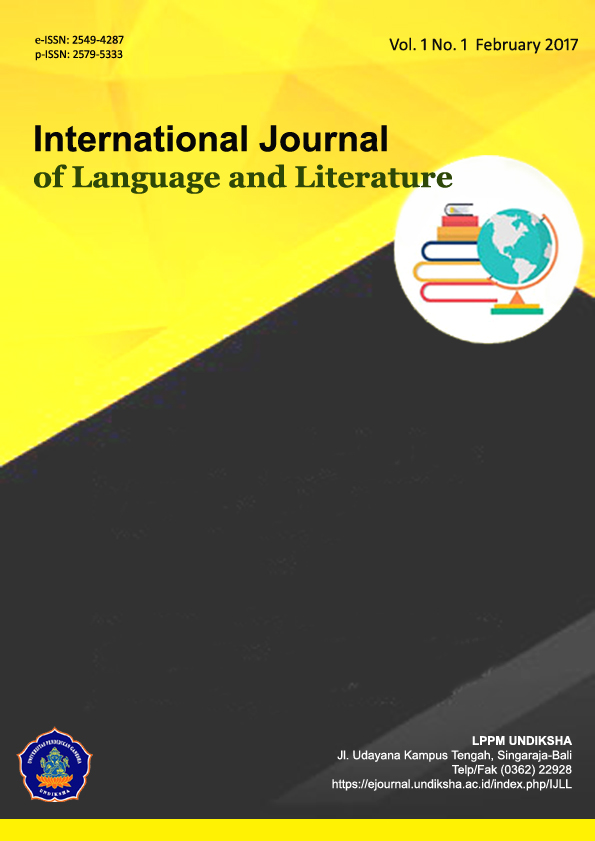A Study of the Students’ Reading Competency in the Junior High School Based on the 2013 Curriculum
DOI:
https://doi.org/10.23887/ijll.v7i2.29526Kata Kunci:
reading competency, descriptive and recount texts.Abstrak
Students’ reading abilities were below of minimum mastery criteria. This study was conducted to describe and analyze the students’ reading competency at junior high school level. The significance was to design and develop reading modular instructions with explicit reading strategies. This study was designed quantitatively. The students’ reading competency was measured quantitatively using a reading competency test. The test consisted of 25 multiple choice items with four options. The obtained data were analyzed quantitatively in two steps, namely: descriptive and inferential analysis. The mean scores of the students’ reading competency based on the reading indicators. The research findings were the mean score of the students’ reading competency in class D was 63.20 and in class H was 36.80. The range score between class D and H was same for descriptive text. However, for recount text, the score in class D was larger than class H. Comparing to class H, the score variability in class D was larger for descriptive text and lower for recount text. The EFL teachers are suggested to use the appropriate reading strategies and materials which can encourage the students for following fun reading activity in the classroom.
Referensi
Ahmadi, M. R., & Gilakjani, A. P. (2012). Reciprocal teaching strategies and their impacts on English reading comprehension. Theory and Practice in Language Studies, 2(10), 2053–2060. https://doi.org/10.4304/tpls.2.10.2053-2060. DOI: https://doi.org/10.4304/tpls.2.10.2053-2060
Anandari, C. L., & Iswandari, Y. A. (2019). Extensive reading in Indonesian schools: a successful story. TEFLIN Journal, 30(2), 137–152. https://doi.org/10.15639/teflinjournal.v30i2/137-152. DOI: https://doi.org/10.15639/teflinjournal.v30i2/137-152
Antoni, N. (2010). Exploring EFL Teachers’ Strategies in Teaching Reading Comprehension. Jurnal Penelitian Pendidikan, 11(2), 39–51. http://www.jurnal.upi.edu.
Awada, G., & Plana, M. G. C. (2018). Multiple strategies approach and EFL reading comprehension of learners with dyslexia: Teachers’ perceptions. International Journal of Instruction, 11(3), 463–476. https://doi.org/10.12973/iji.2018.11332a. DOI: https://doi.org/10.12973/iji.2018.11332a
Baig, S., Siddiquah, A., & Javed, F. (2020). An analysis of the competency ‘reading and thinking skills’ in Grade VIII English textbook. Global Social Sciences Review, 5(1), 231–240. https://doi.org/10.31703/gssr.2020(V-I).24. DOI: https://doi.org/10.31703/gssr.2020(V-I).24
Creswell, J. W. (2012). Educational Research. University of Nebraska.
Delgadova, E. (2015). Reading Literacy as One of the Most Significant Academic Competencies for the University Students. Procedia - Social and Behavioral Sciences, 178(November 2014), 48–53. https://doi.org/10.1016/j.sbspro.2015.03.145. DOI: https://doi.org/10.1016/j.sbspro.2015.03.145
Fazal, S., Hussain, S., Majoka, M. I., & Masood, S. (2012). The Role of Study Skills in Academic Achievement of Students: A Closer Focus on Gender. Pakistan Journal of Psychological Research, 27(1), 37. https://www.academia.edu/download/80901861/23.pdf.
Ghabanchi, Z., & Behrooznia, S. (2014). The impact of brainstorming on reading comprehension and critical thinking ability of EFL learners. Procedia-Social and Behavioral Sciences, 98, 513–521. https://doi.org/10.1016/j.sbspro.2014.03.447. DOI: https://doi.org/10.1016/j.sbspro.2014.03.447
Gheytasi, M., Azizifar, A., & Gowhary, H. (2015). The Effect of Smartphone on the Reading Comprehension Proficiency of Iranian EFL Learners. Procedia - Social and Behavioral Sciences, 199, 225–230. https://doi.org/10.1016/j.sbspro.2015.07.510. DOI: https://doi.org/10.1016/j.sbspro.2015.07.510
Gupta, M., & Ahuja, J. (2014). Cooperative integrated reading composition (CIRC): impact on reading comprehension achievement in English among seventh graders. International Journal of Research in Humanities, Arts and Literature Journals, 2(5), 37–46. http://www.impactjournals.us/download/archives/2-11-1399129002.
Huang, C. T., & Yang, S. C. (2015). Effects of online reciprocal teaching on reading strategies, comprehension, self-efficacy, and motivation. Journal of Educational Computing Research, 52(3), 381–407. https://doi.org/10.1177/0735633115571924. DOI: https://doi.org/10.1177/0735633115571924
Khairuddiniyah, D. (2018). The Implementation of Literacy Strategies in Teaching English by the English Teacher at MAN Insan Cendekia Padang Pariaman. 10(20), 242–257. https://doi.org/10.2991/iconelt-17.2018.30. DOI: https://doi.org/10.2991/iconelt-17.2018.30
Kharaghani, N., & Ghonsooly, B. (2015). The impact of vocabulary knowledge on reading comprehension ability of Iranian English learners receiving reciprocal teaching and cooperative grouping intervention program. International Journal of Research Studies in Education, 4(3), 47–56. https://doi.org/10.5861/ijrse.2015.1006. DOI: https://doi.org/10.5861/ijrse.2015.1006
Khofifah, S., & Ramadan, Z. H. (2021). Literacy conditions of reading, writing and calculating for elementary school students. Journal of Educational Research and Evaluation, 5(3), 342–349. https://doi.org/10.23887/jere.v5i3.37429.
Lestari, R. P., Fitriani, S. S., & Erdiana, N. (2017). Reading Comprehension Difficulties Encountered By Senior High School EFL Students. Research in English and Education (READ), 2(2), 110–118. http://www.jim.unsyiah.ac.id/READ/article/view/5772.
Lin, V., Yeh, H.-C., Huang, H.-H., & Chen, N.-S. (2022). Enhancing EFL vocabulary learning with multimodal cues supported by an educational robot and an IoT-Based 3D book. System, 104, 102691. https://doi.org/https://doi.org/10.1016/j.system.2021.102691. DOI: https://doi.org/10.1016/j.system.2021.102691
Maryati, M., Zubaidah, E., & Mustadi, A. (2019). A content analysis study of scientific approach and authentic assessment in the textbook of Curriculum 2013. Jurnal Prima Edukasia, 7(2), 128–138. https://doi.org/10.21831/jpe.v7i2.26792. DOI: https://doi.org/10.21831/jpe.v7i2.26792
Mokshein, S. E., Ishak, H., & Ahmad, H. (2019). the Use of Rasch Measurement Model in English Testing. Jurnal Cakrawala Pendidikan, 38(1), 16–32. https://doi.org/10.21831/cp.v38i1.22750. DOI: https://doi.org/10.21831/cp.v38i1.22750
Montag, J. L. (2019). Differences in sentence complexity in the text of children ’ s picture books and child-directed speech. First Language, 39(5), 527–546. https://doi.org/10.1177/0142723719849996. DOI: https://doi.org/10.1177/0142723719849996
Nurhayati, D. A. W., & Fitriana, M. W. (2018). Effectiveness of Summarizing in Teaching Reading Comprehension for Efl Students. IJOLTL: Indonesian Journal of Language Teaching and Linguistics, 3(1), 33–50. https://doi.org/10.30957/ijoltl.v3i1.403. DOI: https://doi.org/10.30957/ijoltl.v3i1.403
Prihatini, S. O. (2020). an Analysis of Students’ Difficulties in Reading Comprehension At Sma Negeri 1 Sukodadi Lamongan. E-Link Journal, 7(1), 21. https://doi.org/10.30736/ej.v7i1.261. DOI: https://doi.org/10.30736/ej.v7i1.261
Rusmanayanti, A., & Hanafi, L. (2018). Teaching Reading Comprehension by Using Computer-Based Reading: An Experimental Study in Indonesian English Language Teaching. Arab World English Journal, 4(4), 202–213. https://doi.org/10.24093/awej/call4.16. DOI: https://doi.org/10.24093/awej/call4.16
Salikin, H., Bin-Tahir, S. Z., Kusumaningputri, R., & Yuliandari, D. P. (2017). The Indonesian EFL Learners’ Motivation in Reading. English Language Teaching, 10(5), 81. https://doi.org/10.5539/elt.v10n5p81. DOI: https://doi.org/10.5539/elt.v10n5p81
Sharma, C., & Puri, S. R. (2020). The importance of four skills in English education. The Genesis, 7(4), 33–36. https://doi.org/10.47211/tg.2020.v07i04.007. DOI: https://doi.org/10.47211/tg.2020.v07iws01.003
Sholihah, L.-. (2013). Comparative Study on Reading Comprehension Between Students of Junior High Schools in City and Rural Area. PREMISE JOURNAL:ISSN Online: 2442-482x, ISSN Printed: 2089-3345, 2(2), 169–179. https://doi.org/10.24127/pj.v2i2.690. DOI: https://doi.org/10.24127/pj.v2i2.690
Thomas, L. J. G., Gerde, H. K., Piasta, S. B., Logan, J. A. R., Bailet, L. L., & Zettler-Greeley, C. M. (2020). The early writing skills of children identified as at-risk for literacy difficulties. Early Childhood Research Quarterly, 51, 392–402. https://doi.org/10.1016/j.ecresq.2020.01.003. DOI: https://doi.org/10.1016/j.ecresq.2020.01.003
Wulandari, A. (2020). Implementation of the 2013 Curriculum Based on a Scientific Approach (Case Study at SD Cluster II Kintamani). International Journal of Elementary Education, 4(3), 422. https://doi.org/10.23887/ijee.v4i3.28172. DOI: https://doi.org/10.23887/ijee.v4i3.28172
Zahra, I. A. (2019). The Effect of Debate Activity in English Four Skills: The Students’ Perspective. In UHAMKA International Conference on ELT and CALL, 57–67. http://download.garuda.kemdikbud.go.id/article.php?article=1482949&val=11431.
Zand, V. S. (2015). Modern Journal of Language Teaching Methods. Modern Journal of Language Teaching Methods, 5(3), 1–487. https://www.ceeol.com/search/article-detail?id=330186.
Unduhan
Diterbitkan
Cara Mengutip
Terbitan
Bagian
Lisensi
Hak Cipta (c) 2023 International Journal of Language and Literature

Artikel ini berlisensiCreative Commons Attribution-ShareAlike 4.0 International License.
IJLL Journal provides immediate open access to its content on the principle that making research freely available to the public to supports a greater global exchange of knowledge.

This work is licensed under a Creative Commons Attribution-ShareAlike 4.0 International License







